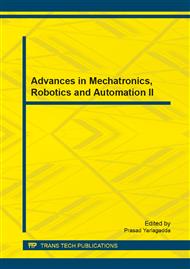p.309
p.314
p.320
p.325
p.329
p.333
p.338
p.342
p.346
Formation Track Association Algorithm in the Presence of Sensor Bias Based on Double Fuzzy Topology
Abstract:
Aiming to solve the track association problem of the formation targets in the presence of sensor bias, a formation track association algorithm based on double fuzzy topology (DFT-FTA) is proposed according to the topology characteristics of the formation tracks. The formations are identified among sensors tracks based on the circulatory threshold model firstly. Then the formation tracks are replaced by their center track so that the first fuzzy topology model is established to realize preparatory association of formation tracks and common tracks. At last, the second fuzzy topology model based on the associated formation tracks and associated common tracks is established to realize formation inner track association. The simulation result shows that the proposed algorithm outperforms the fuzzy track alignment-association algorithm based on target invariable information (TII-FTA) and modified weight track association algorithm (MW-TA).
Info:
Periodical:
Pages:
329-332
Citation:
Online since:
April 2014
Authors:
Price:
Сopyright:
© 2014 Trans Tech Publications Ltd. All Rights Reserved
Share:
Citation:


